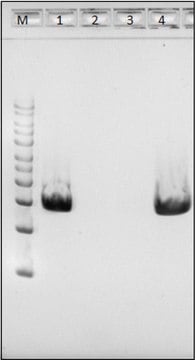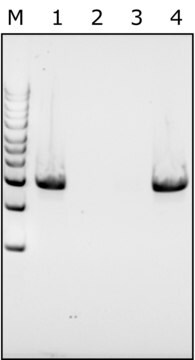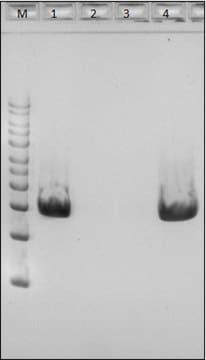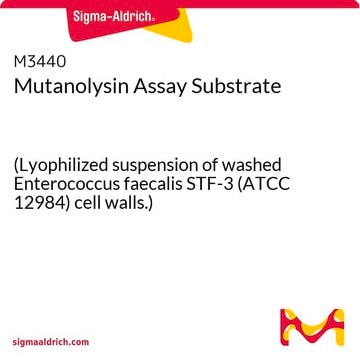MAC4L
MetaPolyzyme
lyophilized powder
Synonyme(s) :
Multilytic Enzyme Mix
Se connecterpour consulter vos tarifs contractuels et ceux de votre entreprise/organisme
About This Item
Code UNSPSC :
12352204
Nomenclature NACRES :
NA.54
Produits recommandés
Forme
lyophilized powder
Niveau de qualité
Technique(s)
DNA extraction: suitable
Adéquation
suitable for microbiology
Application(s)
microbiology
Conditions d'expédition
wet ice
Température de stockage
−20°C
Description générale
Metagenomics analysis looks at all DNA that has been isolated directly from given single samples (e.g. environmental samples, biological organisms). Metagenomics allows for the investigation of microbes that exist in any environment (including extreme environments), and which have been historically difficult to isolate, culture, and study. Metagenomics has revealed the existence of novel microbial species. Applications of metagenomic studies include public health data analysis, discovery of novel proteins, enzymes and natural products, environmental studies, and agricultural investigations.
Application
MetaPolyzyme is a mixture of 6 enzymes that is intended for isolation of total DNA for metagenomics studies. Adapted from an initial formulation devised by S. Tighe,2 MetaPolyzyme was evaluated and developed in consultation and collaboration with the Association of Biomolecular Resource Facilities (ABRF) Metagenomics and Microbiome Research Group (MMRG). Test data on the use of MetaPolyzyme is accessible at the 2017 ABRF MGRG Poster.
Actions biochimiques/physiologiques
Microbes can be difficult to disrupt because the cell walls may form capsules or resistant spores. DNA can be extracted by using lysing enzymes (such as lyticase or chitinase) to induce partial spheroplast formation. Spheroplasts are subsequently lysed to release DNA. MetaPolyzyme is intended for use in metagenomic studies, such as study of microbes and microbiomes of extreme and unique environments. MetaPolyzyme is intended for digestion of microbes for evaluation by whole genome shotgun sequencing for metagenomics and metatranscriptomic approaches.
Composants
The enzymes in MetaPolyzme are:
- Achromopeptidase
- Chitinase
- Lyticase
- Lysostaphin
- Lysozyme
- Mutanolysin
Définition de l'unité
One unit will lyse 0.4 μg of Micrococcus lysodeikticus per minute by turbidimetric detection at 600 nm when suspended in buffer at pH 8.0 at 37 °C.
Mention d'avertissement
Danger
Mentions de danger
Conseils de prudence
Classification des risques
Resp. Sens. 1
Code de la classe de stockage
11 - Combustible Solids
Classe de danger pour l'eau (WGK)
WGK 3
Point d'éclair (°F)
Not applicable
Point d'éclair (°C)
Not applicable
Certificats d'analyse (COA)
Recherchez un Certificats d'analyse (COA) en saisissant le numéro de lot du produit. Les numéros de lot figurent sur l'étiquette du produit après les mots "Lot" ou "Batch".
Déjà en possession de ce produit ?
Retrouvez la documentation relative aux produits que vous avez récemment achetés dans la Bibliothèque de documents.
Les clients ont également consulté
Maria A Sierra et al.
Environmental microbiome, 17(1), 60-60 (2022-12-22)
Lake Hillier is a hypersaline lake known for its distinctive bright pink color. The cause of this phenomenon in other hypersaline sites has been attributed to halophiles, Dunaliella, and Salinibacter, however, a systematic analysis of the microbial communities, their functional
Erratum to: The Metagenomics and Metadesign of the Subways and Urban Biomes (MetaSUB) International Consortium Inaugural Meeting Report.
Microbiome, 4(1), 45-45 (2016-08-20)
Scott Tighe et al.
Journal of biomolecular techniques : JBT, 28(1), 31-39 (2017-03-25)
The Extreme Microbiome Project (XMP) is a project launched by the Association of Biomolecular Resource Facilities Metagenomics Research Group (ABRF MGRG) that focuses on whole genome shotgun sequencing of extreme and unique environments using a wide variety of biomolecular techniques.
Steve Hamner et al.
International journal of environmental research and public health, 16(7), 1097-1097 (2019-04-03)
The Little Bighorn River is the primary source of water for water treatment plants serving the local Crow Agency population, and has special significance in the spiritual and ceremonial life of the Crow tribe. Unfortunately, the watershed suffers from impaired
Nezar Noor Al-Hebshi et al.
Journal of oral microbiology, 11(1), 1557986-1557986 (2019-01-24)
Studies of the microbiome associated with dental caries have largely relied on 16S rRNA sequence analysis, which is associated with PCR biases, low taxonomic resolution, and inability to accurately study functions. Here, we employed whole metagenome shotgun sequencing, coupled with
Notre équipe de scientifiques dispose d'une expérience dans tous les secteurs de la recherche, notamment en sciences de la vie, science des matériaux, synthèse chimique, chromatographie, analyse et dans de nombreux autres domaines..
Contacter notre Service technique











